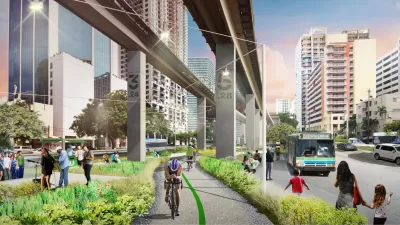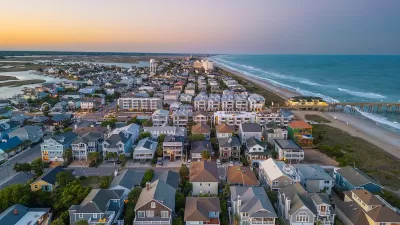With the threat of sea level rise, homes on higher ground in Miami are becoming increasingly desirable. But they are located in low-income communities of color, and residents are facing rising housing costs and displacement.

Mario Ariza reports that the effects of climate change have hit the real estate market in Miami. As wealthier residents seek to move inland away from flooding and other hazards, they are eyeing parts of town that developers have been marketing as climate resistant, says Ariza:
Working-class places like Overtown, Little Haiti, and Liberty City were created by redlining, a historically racist policy that denied mortgages to people of color outside of certain neighborhoods. They are now in rapid transition. And in Miami, those areas just happen to be on high ground.
Elevation is now a selling point, and these neighborhoods are vulnerable to what is being referred to as “climate gentrification.” As rents and home prices skyrocket, residents and businesses are forced out, often to places in South Florida that are closer to sea level.
Community advocates say affordable housing and policies to prevent displacement need to be priorities, since city codes make it difficult to protect existing residents. "That’s because of a provision for developers who acquire at least 9 contiguous acres and commit a small percentage to open space. Those developers can avoid height and density restrictions, move roads, and delay community consultation until late in the planning process," reports Ariza.
Some developers have voluntarily set aside affordable and workforce housing units, but inclusionary zoning mandates cover very little of the city. The city has plans to study affordable housing issues in Miami, but advocates say the situation is dire and more immediate action needs to be taken.
FULL STORY: The Rich Can Afford Higher Ground in Miami. What’s Going to Happen to the Poor?

Alabama: Trump Terminates Settlements for Black Communities Harmed By Raw Sewage
Trump deemed the landmark civil rights agreement “illegal DEI and environmental justice policy.”

Study: Maui’s Plan to Convert Vacation Rentals to Long-Term Housing Could Cause Nearly $1 Billion Economic Loss
The plan would reduce visitor accommodation by 25% resulting in 1,900 jobs lost.

Planetizen Federal Action Tracker
A weekly monitor of how Trump’s orders and actions are impacting planners and planning in America.

Grand Rapids Mayor Proposes Garage Conversion Plan
The mayor says allowing homeowners to convert garages to dwelling units could alleviate the city’s housing shortage.

Baltimore Ordered to Improve Sidewalk Accessibility
The city is one of many to face lawsuits for failing to comply with the Americans with Disabilities Act.

This Toronto Suburb Has More Bus Riders Than Columbus, Ohio
Brampton, Ontario used gradual improvements in service to prove that if you build it, they will ride.
Urban Design for Planners 1: Software Tools
This six-course series explores essential urban design concepts using open source software and equips planners with the tools they need to participate fully in the urban design process.
Planning for Universal Design
Learn the tools for implementing Universal Design in planning regulations.
Smith Gee Studio
Alamo Area Metropolitan Planning Organization
City of Santa Clarita
Institute for Housing and Urban Development Studies (IHS)
City of Grandview
Harvard GSD Executive Education
Toledo-Lucas County Plan Commissions
Salt Lake City
NYU Wagner Graduate School of Public Service





























